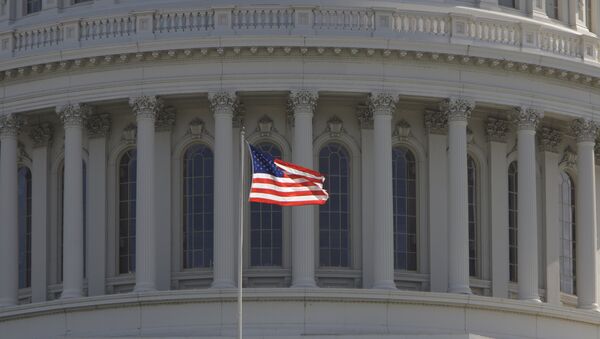WASHINGTON, November 4 (RIA Novosti) — The US Republican Party will likely control both houses of Congress after upcoming midterm elections, which could translate into a more hawkish foreign policy and increased tensions between the United States and Russia, several analysts told RIA Novosti on Monday.
"We [the United States] will emerge with a stronger, hawkish point of view where [US Senator] John McCain will basically be the voice of the Republicans in terms of a more aggressive, military-based foreign policy, coming out of this election," Chris Arterton, professor of Political Management from George Washington University, said.
There will be louder cries for President Barack Obama to take a more aggressive policy against Russia, including with respect to the Ukraine crisis and application of tougher sanctions, Arterton added.
"We are likely to see more sanctions and more carping from Congress that sanctions [against Russia] are not tough enough and aren't working," Arterton said.
Senate candidate Scott Brown is an example of a Republican who, if elected, would flex more foreign policy muscle, including against Moscow, said Republican strategist Tom Rath, who has chaired two Senate campaigns in New Hampshire.
"I think he [Scott Brown] believes that you cannot turn a blind eye towards sort of the expansionist direction at times of the [Russian President Vladimir] Putin government, particularly in terms of the moves in Crimea, and the expansionist nature of Russian interests contrary to those of NATO," Rath said.
According to Rath, Senate candidate Brown believes the United States does not have an "effective counterforce to expansionism by the Soviet Union," Rath added.
For some analysts, like Michael Bernstam, researcher at Stanford University's Hoover Institution, the fact that Russia will be seen as a geopolitical foe by Republicans is a foregone conclusion.
"The Republican-led foreign policy would be more friendly to US friends such as the UK, Europe in general, Israel, and less accommodating to US enemies such as Iran, Russia, etc. But this is easy and predictable," Bernstam said.
Foreign policy has played a major role in President Barack Obama's low ratings, which has indirectly hurt Democrats in the congressional elections, Government Professor at Cornell University Elizabeth Sanders said.
"When you put together foreign policy disasters it contributes to the notion that this is an incompetent administration," Sanders explained.
That sense of incompetence weighing down the president's approval rating hurts every member of his party, which is why many candidates in the Democratic field chose to avoid President Obama's presence on the campaign trail, Sanders said.
US midterm congressional elections are held two years in the middle of the president's four-year term. Voters decide who will fill all 435 seats of the US House of Representatives and 36 of the 100 seats in the US Senate. The Republicans have a majority in the House of Representatives but are looking to also take control of the Senate, where the Democrats currently have a 55 – 45 majority.

